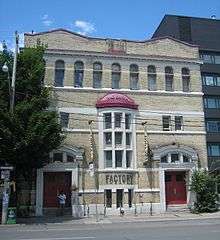Factory Theatre
 The Factory Theatre | |
| Address | Toronto, Ontario |
|---|---|
Factory Theatre is a theatre in Toronto, Ontario, founded as Factory Theatre Lab in 1970 by Ken Gass and Frank Trotz.
Factory was the first theatre to announce that it would exclusively produce Canadian plays, but it soon became a widely emulated policy by other theatre companies. Factory quickly became known as the home of the Canadian playwright, and is especially associated with George F. Walker, most of whose plays premiered there.
For over four decades, Factory Theatre has developed and produced some of the finest theatrical works in Canada's national canon and been home to some of the most gifted and prolific playwrights in Canada.
In any given year, more than 50,000 patrons come to Factory’s historic Victorian mansion at the corner of Bathurst and Adelaide Streets (in the heart of Toronto’s cultural west-end district) – an inviting, inclusive environment where ideas and imagination intersect.
Factory Theatre is unique in that it is committed solely to the development and production of Canadian plays through staged readings, workshops, Natural Resources (resident creation groups), writers’ retreats, residencies, Factory Wired (festivals of new work in progress), and ultimately premiere productions.
The Factory Theatre play development program is committed to the long-term investment of playwrights and creators and Canadian work that celebrates our diversity by engaging, provoking, entertaining, and inspiring our artists, audience and the community at large.
Factory has been known as the home of the Canadian playwright as well as supporting a broad spectrum of forms and voices, and is also dedicated to serving its community by building a strong neighbourhood identity in its role as a cultural hub. Partnerships with local schools and businesses and initiatives, such as its Neighbours Nights and Curtain Raiser events, are what ground it as a remarkable artistic resource and cultural institution.
Building history
Architect Gundry and Langley designed the building in 1869. J.M. Cowan is considered the subsequent architect/consultant.
Factory Theatre consists of two main buildings. The first is the original 1896 house and the second is the 1910 addition. The building is also known as the John Mulvey House. It was given heritage status by the Ontario Heritage Board in 1987.
The original house was constructed in a classic Queen Anne Gothic design for the prominent Toronto merchant John Mulvey in 1869.
It is attributed to architects Gundry & Langley. The house’s architectural features include:
- an asymmetrical façade
- an irregular gabled roof
- a fine buff brickwork with stone sills and hood mouldings
- a Gothic arch entry
In 1909, the property was sold to the Roman Catholic Church, Parish of St. Mary and was used as their Arts and Literary Centre.
The larger addition to the complex was built in 1910 and designed by J.M. Cowan. It includes a church hall set up in theatre style with an overhanging balcony still in use today.
The addition’s main architectural features all face Adelaide Street. They are:
- a distinctive façade
- a central oriel window
- two flanking entrances with arched transoms
Before Factory Theatre occupied the building in 1983, it had been used as a residence, a manse, and a daycare.
Leadership history
In 1977, Gass's own play, Winter Offensive aroused widespread protest because of what was regarded as its gratuitous depiction of sex and violence amongst the upper echelons of the Nazi party. Exhausted by the controversy and frustrated by what he saw as the excessive conservatism and philistinism of the community, Gass resigned. Dian English took over the role of managing director of the Factory (1977-1995) and moved the theatre to its current location in the historic building at the corner of Bathurst and Adelaide (125 Bathurst Street, Toronto, On).
Gass was succeeded as artistic director of Factory by Bob White (1977–87), then Jackie Maxwell (1987–95). During much of this time George F. Walker came on as the in-house writer with plays such as The Art of War, Criminals in Love, Love and Anger, Escape from Happiness and Nothing Sacred. Other notable works included Crossing Over by Neil Munro, The Rez Sisters by Tomson Highway, Rick Mercer's one man show, Robert Lepage's The Dragon's Trilogy and The Kids in the Hall.
English left in 1995 and Michael Springate came on as artistic director for one season, 1995-96. At this point, the theatre experienced a financial downturn and it was widely feared that the company might close for good. However, Gass returned in 1996 to resume the artistic directorship with the intention of putting the theatre back on its feet. His decision to perform all six of the plays in George F. Walker's Suburban Motel as a full season brought the theatre a remarkably swift return to popularity, relevance and financial prosperity.
Gass was fired as artistic director in 2012 amid controversy.[1] Several playwrights, including Walker and Judith Thompson, pulled their work from the theatre in protest, and figures including Atom Egoyan, Gordon Pinsent, Fiona Reid and R. H. Thomson called for a boycott of the company. Since then theatre professionals and community partners have publicity supported Factory Theatre and its existing pursuit of New Canadian voices.[1] Nina Lee Aquino and Nigel Shawn Williams were named the new artistic directors in late 2012.[1]
In December 2014, Factory Theatre presented a re-branding as "Factory. Theatre with Grit" and announced that Aquino was appointed sole artistic director. Factory's current artistic team includes Aquino as artistic director, Williams as associate artistic director and Jonathan Heppner as artistic producer.
References
External links
Coordinates: 43°38′44″N 79°24′10″W / 43.645573°N 79.402721°W